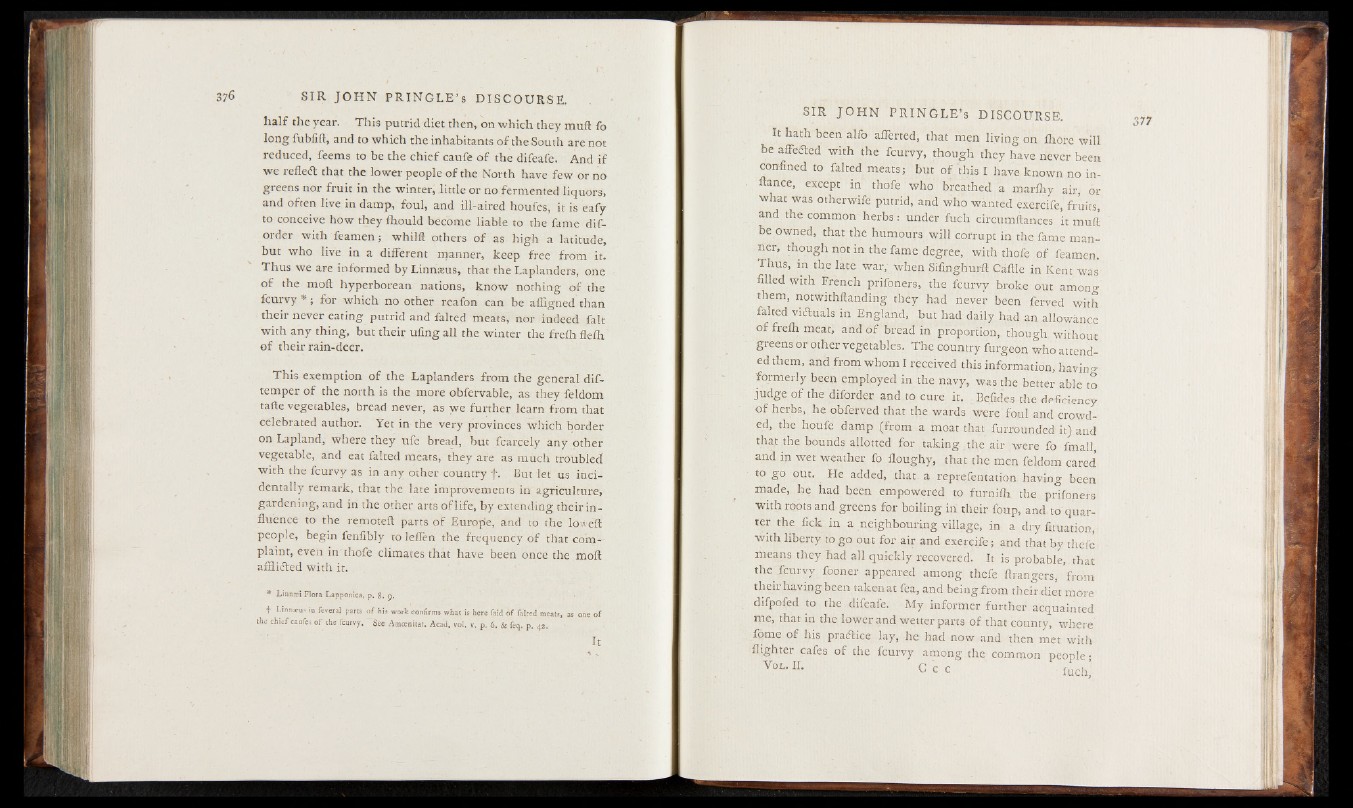
half the year. This putrid diet then, on which they muft fo
long fubfift, and to which the inhabitants of the South are not
reduced, feems to be the chief caufe of the difeafe. And if
we refledt that the lower people of the North have few or no
greens nor fruit in the winter, little or no fermented liquors,
and often live in damp, foul, and ill-aired houfes, it is eafy
to conceive how they fhould become liable to the fame dif-
order with Teamen; whilft others of as high a latitude,
but who live in a different manner, keep free from it.
Thus we are informed by Linnasus, that the Laplanders, one
of the moll hyperborean nations, know nothing of the
fcurvy * ; for which no other reafon can be affigned than
their never eating putrid and falted meats, nor indeed fait
with any thing, but their ufing all the winter the frefh flefh
of their rain-deer.
This exemption of the Laplanders from the general dif-
temper of the north is the more obfervable, as they feldom
tafte vegetables, bread never, as we further learn from that
celebrated author. Yet in the very provinces which border
on Lapland, where they ufe bread, but fcarcely any other
vegetable, and eat falted meats, they are as much troubled
with the fcurvy as in any other country f . But let us incidentally
remark, that the late improvements in agriculture,
gardening, and in the other arts of life, by extending their influence
to the remotefl parts of Europie, and to the loweft
people, begin fenfibly to leflen the frequency of that complaint,
even in thofe climates that have been once the moll
afilifted with it,
* Linnaei Flora Lapponica, p. 8, 9.
f Linnaeus in feveral parts of his work confirms what is here faid of falted meats, as one of
the chief cades of the fcurvy. See Amcenicat. Acad, vol. v. p. 6. & feq. p. 42.
It
SIR JOHN P R I N G L E ’S DISCOURSE. i 77
It hath been alfo aflerted, that men living on fhore will
be affedted with the fcurvy, though they have never been
confined to falted meats 5 but of this I have known no in-
ftance, except in thofe who breathed a marlhy air, or
what was otherwife putrid, and who wanted exercife, fruits,
and the common herbs: under fuch circumftances it muft
be owned, that the humours will corrupt in the fame manner,
though not in the fame degree, with thofe of feamen.
Thus, in the late war/ when Sifinghurft Caftle in Kent was
filled with French prifoners, the fcurvy broke out among
them, notwithftanding they had never been ferved with
falted victuals in England, but had daily had an allowance
of frefh meat, and of bread in proportion, though without
greens or other vegetables. The country furgeon who attended
them, and from whom I received this information, having
formerly been employed in the navy, was the better able to
judge of the diforder and to cure it. Befides the deficiency
of herbs, he obferved that the wards were foul and crowded,
the houfe damp (from a moat that furrounded it) and
that the bounds allotted for taking the air were fo fmall,
and in wet weather fo floughy, that the men feldom cared
to go out. He added, that a reprefentation having been
made, he had been empowered to furnilh the prifoners
with roots and greens for boiling in their foup, and to quarter
the fick in a neighbouring village, in a dry firuation,
with liberty to go out for air and exercife; and that by thefe
means they had all quickly recovered. It is probable, that
the fcurvy fooner appeared among thefe flrangers, from
their having been taken at fea, and being from their diet more
difpofed to the difeafe. My informer further acquainted
me, that in the lower and wetter parts of that county, where
fdme of his practice lay, he had now and then met with
flighter cafes of the fcurvy among the common people •
Vox-.H. C c c fuch;
1